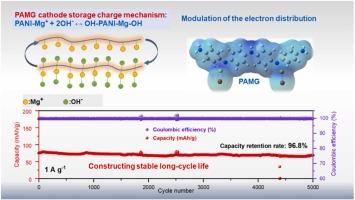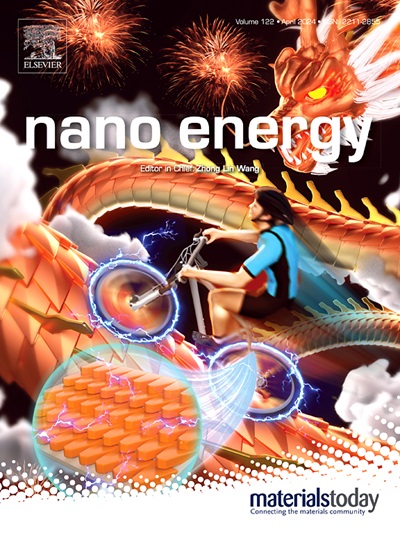在聚苯胺中掺杂镁离子可实现高性能锌镁碱性电池
IF 16.8
1区 材料科学
Q1 CHEMISTRY, PHYSICAL
引用次数: 0
摘要
与中性电解质锌基电池的快速发展形成鲜明对比的是,理论容量更高的可充电碱性锌电池在很大程度上仍未得到充分开发。在此,我们报告了一种新型高性能可充电碱性锌镁电池,它利用掺杂镁的聚苯胺阴极促进可逆氧化还原反应。它利用 PANI 的中性掺杂机制来吸附氢氧根阴离子,从而防止形成不溶性氢氧化镁,并促进高效存储电荷。这种设计使电池在 1.0 A g-1 的电流密度下循环 5,000 次后仍能保持 96.8% 的容量,库仑效率超过 99.8%。理论计算和实验证明,掺杂可通过改变 LUMO 能级来增强导电性并提高放电平台。通过掺杂镁离子来改变阴极结构,从而提高能量密度并控制 Mg(OH)2 的沉积,有望推动锌电池的发展,并对其他高性能水性储能系统产生启发。本文章由计算机程序翻译,如有差异,请以英文原文为准。

Doping of magnesium ions into polyaniline enables high-performance Zn-Mg alkaline batteries
In contrast to the rapid development of zinc-based batteries with neutral electrolytes, rechargeable alkaline zinc batteries with higher theoretical capacity remain largely underexplored. Here, we report a novel high-performance rechargeable alkaline Zn-Mg battery utilizing an Mg-doped polyaniline cathode to facilitate reversible redox reactions. It leverages PANI's neutral doping mechanism to adsorb hydroxide anions, preventing the formation of insoluble magnesium hydroxide and facilitating efficient storage charge. This design allows the battery to retain 96.8 % of its capacity after 5000 cycles at a current density of 1.0 A g−1, with coulombic efficiency above 99.8 %. Theoretical calculations and experiments demonstrate that doping enhances conductivity and raises the discharge plateau by altering the LUMO energy level. Altering the cathode structure by doping Mg ions to increase energy density and control Mg(OH)2 deposition is expected to advance the development of zinc batteries and inspire other high-performance aqueous energy storage systems.
求助全文
通过发布文献求助,成功后即可免费获取论文全文。
去求助
来源期刊

Nano Energy
CHEMISTRY, PHYSICAL-NANOSCIENCE & NANOTECHNOLOGY
CiteScore
30.30
自引率
7.40%
发文量
1207
审稿时长
23 days
期刊介绍:
Nano Energy is a multidisciplinary, rapid-publication forum of original peer-reviewed contributions on the science and engineering of nanomaterials and nanodevices used in all forms of energy harvesting, conversion, storage, utilization and policy. Through its mixture of articles, reviews, communications, research news, and information on key developments, Nano Energy provides a comprehensive coverage of this exciting and dynamic field which joins nanoscience and nanotechnology with energy science. The journal is relevant to all those who are interested in nanomaterials solutions to the energy problem.
Nano Energy publishes original experimental and theoretical research on all aspects of energy-related research which utilizes nanomaterials and nanotechnology. Manuscripts of four types are considered: review articles which inform readers of the latest research and advances in energy science; rapid communications which feature exciting research breakthroughs in the field; full-length articles which report comprehensive research developments; and news and opinions which comment on topical issues or express views on the developments in related fields.
 求助内容:
求助内容: 应助结果提醒方式:
应助结果提醒方式:


